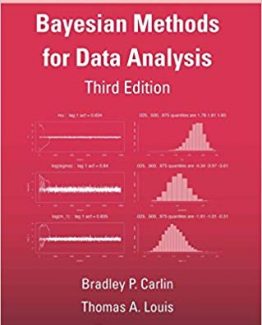Motor Learning and Development Second Edition, ISBN-13: 978-1492536598
[PDF eBook eTextbook]
464 pages
Publisher: Human Kinetics, Inc.; Second edition (October 2, 2017)
Language: English
ISBN-10: 9781492536598
ISBN-13: 978-1492536598
Motor Learning and Development, Second Edition provides a foundation for understanding how humans acquire and continue to hone their movement skills throughout the life span. These fundamentals will give students the tools they need to create, apply, and evaluate motor skill programs for learners and clients at all skill and development levels, from elite athletes to those with severe disabilities.
The second edition maintains the unique focus of the original, covering the basics of motor learning and development simultaneously. The text has been revised and updated with current research and examples, and it includes the following enhancements:
• Three new chapters, Understanding Movement Control, Infant Motor Development, and Devising a Plan, provide more depth on fundamental topics.
• Reorganized content in part I allows for deeper understanding of complex topics.
• Parts II and III are reorganized to group content by topic rather than by age group, in order to better infuse the two fields of motor learning and motor development.
• Updated What Do You Think? and Try This sidebars engage students in applying concepts, and sample answers in the instructor guide help provide feedback on those applications.
Motor Learning and Development, Second Edition, combines these two subdisciplines of motor behavior in an accessible and easy-to-follow manner. Part I provides an outline of the fundamental concepts of both motor learning and motor development. Part II explores movement patterns across the life span, from infancy to older adulthood, with a new chapter focusing on infant motor development. Part III examines the changing individual constraints throughout the life span, including physiological, psychological, and sociocultural factors and changes related to age. Finally, part IV prepares students to create and implement developmentally appropriate movement programs, closing with a new chapter, Devising a Plan.
Learning aids throughout the book include chapter objectives, glossary terms, and supplemental activities to emphasize the evolution from research to practice. Revised opening vignettes in each chapter demonstrate the breadth of professions that utilize knowledge of and research in motor behavior. The significantly upgraded instructor ancillaries—an instructor guide, test package, and presentation package—are free to course adopters.
Motor Learning and Development provides students with the fundamental understanding of movement skills that they need in order to develop, implement, and critically assess motor skill programs.
About the Author
Pamela S. Haibach-Beach, PhD, is a professor in the department of kinesiology, sport studies, and physical education (KSSPE) at the College at Brockport, State University of New York. Haibach-Beach earned her doctorate in kinesiology with an emphasis in motor behavior from Pennsylvania State University under the advisement of Dr. Karl M. Newell. She is the coordinator of the kinesiology major and the study abroad program in the KSSPE department.
Haibach-Beach’s research focuses on motor learning, motor development, and balance, including those of developing individuals, individuals with disabilities, and other special populations. Haibach-Beach regularly presents and conducts workshops at national and international conferences related to motor behavior. She is founder and codirector of the Institute of Movement Studies for Individuals With Visual Impairments (IMSVI).
Haibach-Beach serves as an elected board member for the American Kinesiology Association (AKA) and also chairs the AKA publications committee. She is a former president of the National Association for Sport and Physical Education (NASPE) Motor Development and Learning Academy and is a member of the International Federation for Adapted Physical Activity (IFAPA), the Society of Health and Physical Educators (SHAPE America), International Society of Motor Control (ISMC), and the North American Society for the Psychology of Sport and Physical Activity (NASPSPA). Active in her community, Haibach-Beach serves as a cochair for an active-community initiative called Walk! Bike! Brockport! and is a Brockport Lions Club member.
In her free time, Haibach-Beach enjoys being physically active and spending time outdoors. She, her husband, and her two children reside in Brockport, New York. As both a researcher and a mother, she enjoys experiencing the growth and development of her two children.
Gregory D. Reid, PhD, is a professor emeritus in the department of kinesiology and physical education at McGill University in Montreal, Quebec. A former elementary school physical education teacher and longtime youth coach in ice hockey and baseball, Reid obtained his graduate education in adapted physical activity, motor learning, and special education at the University of California (UCLA) and Pennsylvania State University. As a teacher and researcher, he maintained a strong focus on theory-to-practice applications. Reid’s research covered performance, learning, and development; spanned children to older adults; and included an emphasis of individuals with and without disabilities.
In addition to his teaching and research, Reid supervised practicum experiences of undergraduates teaching individuals with disabilities. He is a former undergraduate and graduate program director and chair of the department of kinesiology and physical education at McGill University.
In 1997, Reid received the G. Lawrence Rarick Research Award from AAHPERD’s National Consortium for Physical Education and Recreation for Individuals with Disabilities. He was elected an international member of the American Academy of Kinesiology in 1999. He is also a fellow of the International Federation of Adapted Physical Activity (IFAPA) and the 2015 recipient of their Elly D. Friedmann Professional Contribution Award.
Reid and his wife, Carol, reside in Sainte-Adele, Quebec. They have two grown sons, Drew and Tyler. In his free time Reid enjoys hiking, bicycling, cross-country and downhill skiing, and reading novels. And he never tires of observing the motor development and learning accomplishments of his grandchildren, Jacob, Chloe, and Ethan.
Douglas H. Collier, PhD, is an associate professor in the department of kinesiology, sport studies, and physical education at the College at Brockport, State University of New York. Collier was a delegate to the Jasper talks (1985), a significant policy workshop that became the catalyst to Collier’s career-long interest in motor development. For the past three decades, his research agenda has examined various facets of motor development that pertain to the education of typically developing children and those with identifiable disabilities. He is also interested in positive and proactive solutions to challenging behavior in school-age learners. Collier has presented his research at multiple national and international conferences concerned with the study of motor development and pedagogy.
Over the course of his 24-year career in higher education, Collier has served in multiple leadership positions at local, state, and national levels. He is a member of the North American Federation of Adapted Physical Activity (NAFAPA), the Society of Health and Physical Educators (SHAPE America), and the North American Society for the Psychology of Sport and Physical Activity (NASPSPA).
Collier holds a doctorate in human performance from Indiana University, where he studied under the advisement of Drs. Dale Ulrich, Beverly Ulrich, and Esther Thelen. In his free time, Collier enjoys racket sports, photography, and canoeing. He and his wife, Christine, reside in Brockport, New York. They have two grown daughters, Robin and Shannon.
What makes us different?
• Instant Download
• Always Competitive Pricing
• 100% Privacy
• FREE Sample Available
• 24-7 LIVE Customer Support






Reviews
There are no reviews yet.